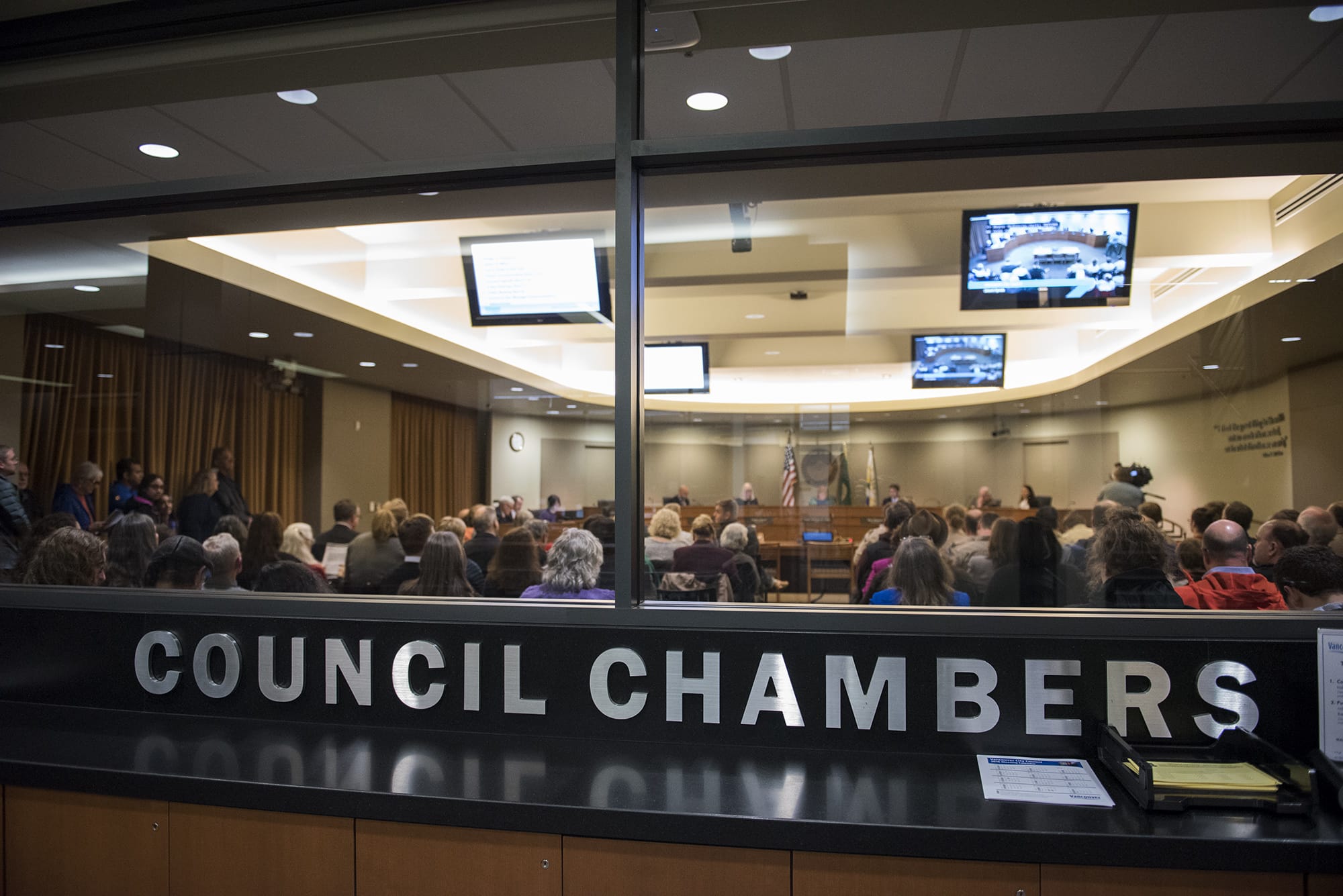Long-term financial stability in Vancouver means the city will need to collect an additional $30.1 million annually, according to an advisory committee tasked with finding new sources of revenue.
In presenting the final, sweeping package of recommendations to the city council Monday afternoon, the Executive Sponsors Council for A Stronger Vancouver proposed a three-way split to shoulder the burden: $9.7 million from an increase in property taxes, $9.7 million from beefed-up business taxes and $10.7 million from other miscellaneous taxes and fees.
During the presentation, council members Tim Schauer, Jennifer Rhoads, Holly Williams and Casey Wyckoff said the idea was to spread the cost increases equitably, so that no one group was hit disproportionately hard.
They also advocated against a piecemeal approach. The city council should implement everything, the group said, and they should do it all at once.
“We strongly encourage the council to implement these actions in unison,” said Rhoads, who also serves as president of the Community Foundation of Southwest Washington.
The first category, property taxes, would require a voter-approved ballot measure for a multi-year permanent levy lid lift. The proposal would collect $0.44 per $1,000 of assessed property value — or about $154 per year for a home assessed at $350,000.
Money generated through the levy lid lift would go toward commercial district infrastructure improvements in areas that need a boost, like the Fourth Plain Corridor and the Heights Subarea.
Property taxes under the plan would also go toward replacing two fire stations, renovating three others, and enhancing the parks system — building nine new parks on city property, improving 14 existing parks and redesigning two others.
Reinstatement of the Business and Occupancy tax, or the B&O tax, drives the second branch of proposed revenue.
Vancouver hasn’t collected a B&O tax since 2002. The Stronger Vancouver recommendations would re-implement a $0.55 per $1,000 tax on gross annual revenue for the city’s businesses, which is expected to generate $5.5 million per year. The state levies a B&O tax, but Vancouver doesn’t currently exercise its local option.
The plan would also bump the city’s business head tax up by $70 per employee for each full-time equivalent employee. The increase is expected to raise an additional $4.2 million per year.
This additional revenue would fund homelessness services and responses, commercial district improvements, an additional police unit and a traffic safety program, among other uses.
The final, miscellaneous category of new taxes and revenues includes a 2.5 percent increase to the current utility tax rate ($2.7 million), a city tax on internet sales ($3 million), increased Park Impact Fees ($2.6 million), a $10 increase to vehicle tab rates ($1.2 million), a Downtown Improvement Area that would collect $0.42 per $1,000 of assessed value of downtown businesses ($700,000) and an admissions tax that would collect 5 percent of ticket sales ($500,000).
All told, the city had to draw from a frustratingly shallow toolbox to raise revenue, Schauer said. Many of the least-regressive tools, like an income tax, aren’t allowed in Washington. But the committee tried its best to spread expenses thinly enough to keep from overburdening any one resident or business, he said.
“This is a long view. It’s a big ask,” Schauer said. “It’s a hard conversation, but I think it’s an important one.”
The need
A Stronger Vancouver started its task back in May 2017. The 10-person Executive Sponsors Council included members from various city factions including businesses, parks and government.
At the time, Vancouver was up by 25,000 residents and 3,000 businesses compared to a decade prior, while dealing with a city staff slashed down by 110 people during the Great Recession.
“Looking back at the last decade, we see unprecedented growth and a rate of change that outpaces the city’s resources,” Wyckoff said.
The ESC’s job was to figure out how to crunch the numbers and take Vancouver from survival mode into a sustainable, fair future.
“We knew that investments were being made throughout the community, but maybe they weren’t always equitable,” Rhoads said.
Last year, the group ruffled some feathers when the first phase of its plan to add $6.1 million to the police department’s annual budget earned criticism for imposing a head tax on employees at nonprofits. The city council ultimately decided to rescind the nonprofit head tax. The final plan, passed Oct. 1, increased utility taxes by 4 percent over two years and increased the business license fee from $125 to $200.
The latest package of proposals will again go before the city council for a follow-up workshop on Monday. After that, the council will participate in a 4-hour miniretreat to consider the details of the revenue component.
The proposals presented Monday evening provide a strong anchor point, but are by no means set in stone, said City Manager Eric Holmes.
More details about the plan, including a calculator for businesses to determine how much more they’d owe the city annually under the draft proposals, can be found at strongervancouver.org.




